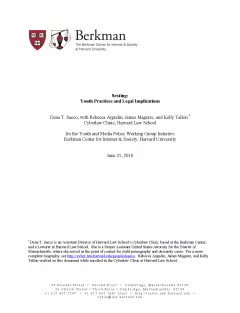"Sexting": legal and practical issues
The Berkman Center is pleased to share our Youth and Media Policy Working Group Initiative's latest document, which addresses legal and practical issues related to the practice colloquially known as sexting:
Sexting: Youth Practices and Legal Implications (PDF)
The document was prepared by Harvard Law School's Cyberlaw Clinic, based at the Berkman Center, for the Risky Behaviors and Online Safety cluster of the Youth and Media Policy Working Group Initiative. It is intended to provide background for discussion of interventions related to sexting. It begins with a definition of sexting, and continues with overviews of research and media stories related to sexting. It then discusses the statutory and constitutional framework for child pornography and obscenity. It concludes with a description of current and pending legislation meant to address sexting.
The Youth and Media Policy Working Group Initiative aims to bring the best research on youth and media into policy-making debates and to propose practical, relevant, situated solutions based upon that research. The Initiative is exploring policy issues that fall within three substantive clusters emerging from youth’s information and communications technology practices: Risky Behaviors and Online Safety; Privacy, Publicity and Reputation; and Youth Created Content and Information Quality. The Initiative is funded by the John D. and Catherine T. MacArthur Foundation and is co-directed by danah boyd, Urs Gasser, and John Palfrey. For more information, including a list of publications to date, please visit http://cyber.harvard.edu/research/digitalnatives/policy.
As part of the Risky Behaviors and Online Safety cluster, we also recently released the following four essays:
- Moving Beyond One Size Fits All With Digital Citizenship by Matt Levinson and Deb Socia
- Evaluating Online Safety Programs by Tobit Emmens and Andy Phippen
- The Future of Internet Safety Education: Critical Lessons from Four Decades of Youth Drug Abuse Prevention by Lisa M. Jones
- Online Safety: Why Research is Important by David Finkelhor, Janis Wolak, and Kimberly J. Mitchell
We look forward to sharing more work from the Initiative as it becomes available.

